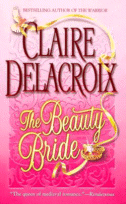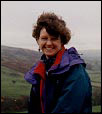Nine Tips For Aspiring Romance Writers
by Claire Delacroix
There is no other lifestyle perceived to be attractive to so many people as that of a writer. Collectively, we have a romantic notion of a writer’s life – days spent dreaming, nights spent over-indulging, long debated in cafés, impulsive journeys to exotic destinations, checks coming over the ransom all the time to fund this opulent living – so it’s understandable that people have such a vision alluring. Romance writers are envisions with an even more glamorous life: we are supposed to recline on chaise lounges, drift around in silk peignoir sets, subsist on chocolate bonbons and champagne, dictate our books to an avid secretary/fan, and wait for the inevitable millions in royalties.

|
For those who are undeterred by this warning, here are a few tips for becoming a romance writer:
Write what you read.
In a sense, this is similar to the old advice that you should write what you know. When you read a great deal of any kind of book, you will develop an innate sense of the rhythms of that kind of book. You will know how those kinds of stories are told and what elements have to be present to make the story work. You will know, on a gut level, what makes a book of that type exceptional, which will make it easier for you to ensure that your book is exception. That, in turn, will give you a better chance of selling that book to a publisher. Which is a long way of saying that if you don’t read romance novels, you’ll have a hard time writing a good romance novel.
Be prepared to work long and hard, perhaps for no compensation beyond experience.
This is true of all authors, regardless of genre. Fiction authors are generally self-employed and work freelance. This means that authors get paid for what is produced, not just for showing up at the office and drinking coffee. To produce work on a reliable basis at a consistent and predictable volume – i.e. in order to both set and make delivery deadlines – authors need to have discipline and a work schedule. Many authors work more than five days a week; many work more than eight hours a day. If writing is what you love, of course, this isn’t as onerous as it might sound.
Keep your day job.
It takes a long time to establish a career as a writer in any genre, longer than you might think (or hope!) This really means that it takes a long time to reliably make good money with your writing. Most people can’t be creative while worrying about paying the rent, so keep your day job, not just until it appears that you’re on your way but until your bank account balance proves that you are. Alternatively, you could take Dorothy Parker’s advice and simply “marry money”.
Read voraciously.
The only way to know what is selling – and to be able to fathom a guess as to why – is to read a tremendous amount, not only of fiction but also newspapers and magazines. Authors of genre fiction (genres are mystery, romance, etc.) are in the business of entertainment, which is a facet of popular culture. Fiction, especially genre fiction, tends to reflect popular culture and the social concerns of the moment. Popular culture changes constantly and so requires a vigilant eye.
Polish your crystal ball.
Authors of genre fiction need to anticipate future trends. Not only does popular culture evolve constantly and affect what will sell at any given moment, but a book does not pass immediately from an author’s hands into the marketplace. Any book will spend approximately a year in production at the publisher, being transformed from a manuscript into the finished book that you see in stores. In addition to that year, the time that it will take the author to write the book has to be added into the equation. An author could be writing a proposal today for a book that won’t be available in stores for two, three or even four years. Anticipating what the popular trends will be at that point in time is a tricky business – and the longer it takes you to write a book and place it, the better you have to be at making such forecasts.
Hone your craft.
The best way to protect your future as a writer is to improve your work constantly. There is always more to learn about language, as well as about storytelling, fulfilling reader expectation, characterization and more. Writing embraces many disciplines, and there are a thousand ways to hone your craft. Read. Subscribe to a specialist magazine for a subject or occupation of which you are ignorant. Learn another language. Listen to the voices of other people and identify what makes them distinct. Analyze whatever you read. Attend plays and movies and look for the thread of popular culture within their fabric. Travel. Eavesdrop. Think.
Cultivate laughter.
Murphy’s Law must have come from publishing. In a business in which much can go wrong, something often does. Authors usually have very little control over the publishing process, though we are the most affected by its results. When you can’t fix or change something, you’d best find something funny about it. Your sanity is a precious commodity, after all.
Get a feather boa.
Just because.
Copyright © 2005 by Claire Delacroix
 **A confessed romantic dreamer, bestselling author Claire Delacroix always
wove stories in her mind. Since Claire's first medieval romance --
The Romance of the Rose -- was published in 1993, she has won numerous
awards and accolades.
The Beauty, part of her successful "Bride Quest"
series, was her first book to land on the New York Times' Extended List of
Bestselling Books. Claire has well over two million books in print, which include
historical romances as well as contemporary and paranormal romances published
under the name Claire Cross. Her latest novel is The Beauty Bride
(Warner Books).
**A confessed romantic dreamer, bestselling author Claire Delacroix always
wove stories in her mind. Since Claire's first medieval romance --
The Romance of the Rose -- was published in 1993, she has won numerous
awards and accolades.
The Beauty, part of her successful "Bride Quest"
series, was her first book to land on the New York Times' Extended List of
Bestselling Books. Claire has well over two million books in print, which include
historical romances as well as contemporary and paranormal romances published
under the name Claire Cross. Her latest novel is The Beauty Bride
(Warner Books).
Return to the February 2005 issue of The IWJ.
